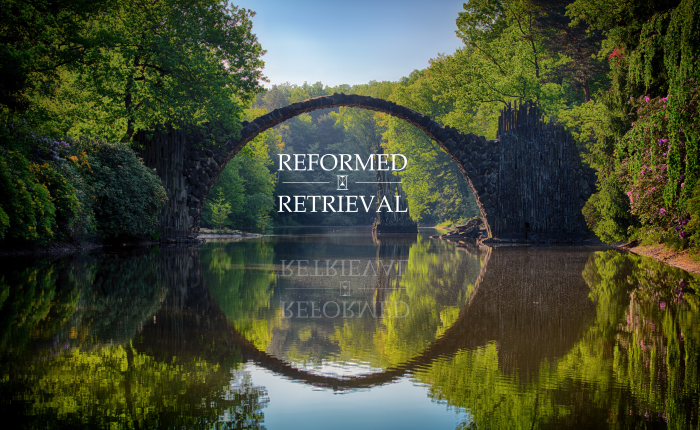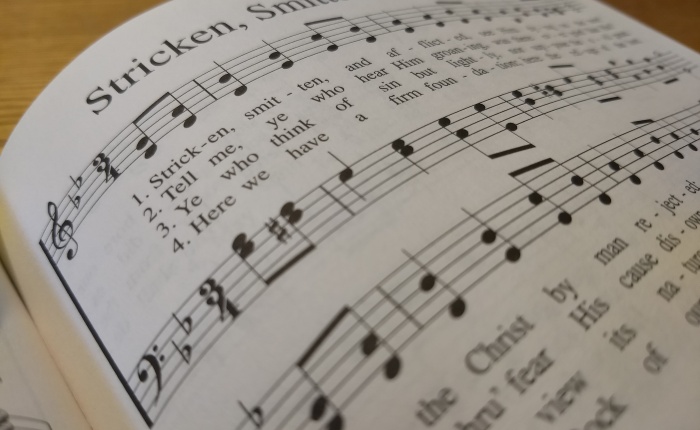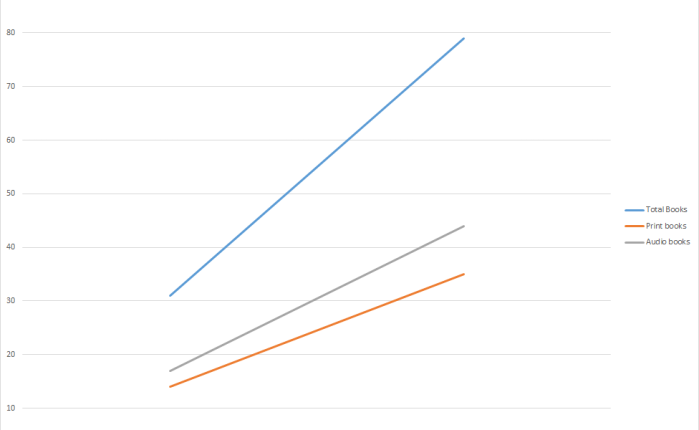Over the past few years, I have been publishing classic theological works that are now either out of print, only available as facsimiles, or (in my estimation) too expensive. This past year (2021), I’ve found that others are interested in obtaining these works as well, so I formed my own little publishing house: Reformed Retrieval. What began at first as a simple project for myself to buy books has turned into a full on hobby and, I hope, one that adds value to the lives of others. The mission of Reformed Retrieval is to recover the theology of the past, for the present. If this is of interest to you, head over and check it out or click one of the buttons below.
The Gloria Patri
The Gloria Patri, which means “Glory be to the Father,” has a rich history of use in the Christian church. It is also known as the lesser doxology, in comparison to the greater doxology, the Gloria in Excelsis Deo. The text of the Gloria Patri is simple, but profound:
Continue reading “The Gloria Patri”Glory be to the Father, and to the Son, and to the Holy Ghost;
As it was in the beginning, is now, and ever shall be:
world without end. Amen.
John Owen on Theological Method
I recently read John Owen’s “A Brief Declaration and Vindication of the Doctrine of the Trinity” and was impressed, not only with the content, but with the method which Owen used to lay out the doctrine. I found it pastorally helpful and theologically insightful. His manner involved two steps: First, laying out the doctrine as expressed in Scripture, and second, further explaining and defending them so that we may understand them rightly and not have any “undo apprehensions concerning God” (p. 14). In other words, Christians are bound to believe the doctrine as expressly revealed in Scripture as an object of faith, and explanation of the doctrine is given for the further edification of the saints, including the answering of objections.
Let me show you in Owen’s own words how he conceives of this method. He says,
Continue reading “John Owen on Theological Method”Why I Don’t (and Won’t) Watch the Chosen
The Chosen, now on season two, has taken the world of Christian film by storm. Not only that, but season one was the largest crowd funded film project to date. From everything I hear it’s not like the regular, cheesy Christian film we’re used to and the production value is high, even when compared to secular shows. However, I do not and will not watch it.
Many Christian’s are wary of the new TV series The Chosen because of its Mormon influence. After all, it is produced by Angel Studios, a Mormon owned and run production studio. Though the director, Dallas Jenkins, claims to be an evangelical Christian and has final creative say over the series, I think that is a legitimate concern.
But it’s not why I won’t watch it. I will not watch The Chosen simply because I believe in that making images of any member of the Trinity, Jesus included, is unbiblical. I believe that for seven reasons:
Continue reading “Why I Don’t (and Won’t) Watch the Chosen”“Come Behold the Wondrous Mystery” Analysis
| Come behold the wondrous mystery In the dawning of the King; He the theme of heaven’s praises, Robed in frail humanity. In our longing, in our darkness, Now the light of life has come; Look to Christ, who condescended; Took on flesh to ransom us. Come behold the wondrous mystery: He the perfect Son of Man; In His living, in His suffering, Never trace nor stain of sin. See the true and better Adam Come to save the hell-bound man; Christ the great and sure fulfillment Of the law; in Him we stand. Come behold the wondrous mystery: Christ the Lord upon the tree; In the stead of ruined sinners, Hangs the Lamb in victory. See the price of our redemption, See the Father’s plan unfold, Bringing many sons to glory – Grace unmeasured, love untold! Come behold the wondrous mystery Slain by death, the God of life; But no grave could e’er restrain Him; Praise the Lord; He is alive! What a foretaste of deliverance, How unwavering our hope: Christ in power resurrected, As we will be when he comes. | Eph. 3:6, Col. 1:26, 1 Pet. 1:12 Mal. 4:2, Luke 1:78-79 Ps. 103:20-21, 148:2, Isa. 6:1-4 John 1:14, Phil. 2:7-8, Heb. 2:14 Col. 1:13 John 1:4-9 Phil. 2:6-8 Mark 10:45, Heb. 2:14 Eph. 3:6, Col. 1:26, 1 Pet. 1:12 John 1:51, Heb. 4:15 Heb. 4:15, 1 Pet. 1:19 Rom. 5:12-21, 1 Cor. 15:45 Luke 19:10, John 3:17 Luke 24:44, 2 Cor. 1:20 Eph. 3:6, Col. 1:26, 1 Pet. 1:12 Acts 5:30 2 Cor. 5:21 Col. 1:13-15 Rom. 8:32 Acts 2:23, 4:27-28, Eph. 1:10, 3:1-12 Heb. 2:10 Eph. 2:4-7 Eph. 3:6, Col. 1:26, 1 Pet. 1:12 Acts 3:15 Acts 2:24 Matt. 28:6 1 Cor. 15:20-23 Heb. 6:19 Rom. 1:4 Phil. 3:20-21 |
Questions for Understanding Romans 13
Romans 13 has proven to be somewhat of a debated text throughout church history, to but it mildly. Today, it is used by Christians of all stripes to support their own political ideology. In particular, libertarian Christians have been questioning the dominant protestant interpretation of Romans 13 as granting moral legitimacy to the modern state. Much good work has been done to place Romans 13 in the broader biblical-theological context drawn from key texts such as 1 Samuel 8 and Revelation 13.
However, one generally lacking feature in libertarian circles with regards to the discussion of Romans 13 is a detailed grammatical and syntactical exegesis of the text. If we libertarians ever wish to convince the broader Christian community that ours is a biblically faithful position, we must provide such. Toward that end, here is my list of questions that need to be answered to provide a persuasive interpretation of Romans 13:1:[1]
Continue reading “Questions for Understanding Romans 13”Christ Is Risen! Hymn Reflection
This resurrection hymn by Keith and Kristin Getty is one of the best examples of contemporary hymnody.
Continue reading “Christ Is Risen! Hymn Reflection”The Best Passion Hymn You’ve (Probably) Never Sung
“Stricken, Smitten, and Afflicted” is perhaps the best passion hymn you’ve (probably) never heard of. It is sadly absent from many modern hymnals and functionally absent from many contemporary congregations. One of the tests for whether a song is worthy of congregational singing is whether it rewards extended contemplation, i.e. is this a song whose meaning (like the Psalms) is only further deepened upon study? I believe that this hymn does reward such contemplation and hope to explain why in this brief study of its lyrics, poetics, and music:
Continue reading “The Best Passion Hymn You’ve (Probably) Never Sung”My 2020 Reading Stats
This year has been quite a wild ride, but one thing that has not changed is the necessity of reading good books. Neil Postman once wrote,
“Almost all of the characteristics we associate with mature discourse were amplified by typography, which has the strongest possible bias toward exposition, a sophisticated ability to think conceptually, deductively and sequentially; a high valuation of reason and order; an abhorrence of contradiction; a large capacity for detachment and objectivity; and a tolerance for delayed response.”
Amusing Ourselves to Death, p. 63
It is these very qualities that I wish to cultivate in myself and so I devote a significant time of my life to reading. More than that, I find the reading of a great book to be one of the most consistent and accessible paths to joy (used in C. S. Lewis’ idiom).
Continue reading “My 2020 Reading Stats”What I Read in 2020
For those interested in my reading statistics, see this post.
Apologetics
City of God Aurelius Augustine
This one has been on my list to read for a while and I finally got to it, albeit in audio form. On the whole, I was very impressed with the breadth of this work. Written as an apologetic against detractors of the faith, Augustine systematically dismantles the pagan roman religion and then sets forth the Christian conception of history. I highly recommend this book to anyone wanting to dive into patristic theology and after they’ve read The Enchiridion.
Continue reading “What I Read in 2020”





You must be logged in to post a comment.